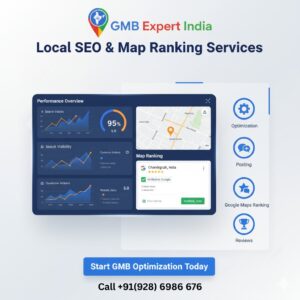Local SEO has become one of the most essential digital marketing strategies for small businesses aiming to attract nearby customers and improve their online presence. Whether you run a restaurant, clinic, retail store, service agency, or any neighborhood-based business, visibility in local searches directly impacts sales, footfall, and brand trust. Many businesses rely on local seo services for small business to stay competitive, especially as customers increasingly use mobile searches and “near me” keywords before making decisions. By implementing the right local SEO techniques, small businesses can secure top positions in Google’s local pack, boost customer engagement, and outperform competitors who still underestimate the power of local search optimization.
Table of Contents
ToggleOptimize Google Business Profile (GBP)
Your Google Business Profile is the foundation of strong local SEO. It is often the first platform customers use to discover your business, check reviews, navigate to your location, or make a direct call. A fully optimized GBP increases your chances of appearing in the local map pack, which receives the highest clicks for location-based searches.
To optimize your profile effectively, ensure that all business details—name, address, phone number, website, operating hours, and service areas—are accurate and consistent. Add high-quality images of your storefront, products, services, and team to enhance trust. Posting weekly updates, offers, events, or announcements also increases profile activity and signals relevance to Google. Encourage customers to leave positive reviews and respond to all reviews promptly, as engagement plays a significant role in improving visibility.
A well-maintained GBP not only boosts local rankings but also helps build credibility with potential customers who are researching businesses before making a purchase decision.
Local Keyword Optimization
Local keyword optimization is one of the strongest ways to target customers who are actively searching for your services. Start by identifying the most relevant local keywords related to your niche, location, and customer intent. These may include “near me” keywords, city-based keywords, service-specific keywords, and problem-focused search terms. Google Keyword Planner, Semrush, and Google Trends are excellent tools to identify the best-performing keywords in your region.
Once you have your list, strategically integrate these local keywords across your website. Focus on optimizing titles, URLs, meta descriptions, headers, homepages, service pages, and blogs. For example, instead of simply writing “Best Plumber,” use “Best Plumber in Delhi” or “Affordable Plumbing Services Near Me.” This helps Google understand where your business operates and which audience you want to target.
Local keyword optimization is even more effective when combined with engaging, informative, and high-quality content that answers customer queries. Include location-based details in your content to help search engines match your business with the right search terms. A well-optimized site with targeted local keywords significantly improves search visibility and draws consistent organic traffic.
Build High-Quality Local Citations
Citations play a crucial role in improving a business’s local search ranking. A citation is any mention of your business’s NAP (Name, Address, Phone Number) on online directories, business listings, social platforms, and local industry websites. Consistent citations help Google verify the legitimacy and accuracy of your business information, ultimately improving your ranking potential.
Start by listing your business on top directories such as Google Business Profile, JustDial, IndiaMart, Sulekha, Yelp, Yellow Pages, and social platforms like Facebook and LinkedIn. Beyond general directories, consider niche-relevant directories as well—such as real estate sites for property businesses or health directories for clinics. Ensure your NAP information is consistent across all platforms; even small variations in your address or phone number can confuse search engines and negatively affect rankings.
Local citations also strengthen your online reputation. Many customers read directory profiles before visiting a business, so providing complete details, service descriptions, and visuals can help in building trust. Regularly monitoring and updating your citations ensures accuracy and retains your credibility in front of both users and search engines.
See also: How Enterprise SEO Services Strengthen Large-Scale Digital Growth
Conclusion
Local SEO is a powerful strategy that helps small businesses establish a strong online presence, attract more customers, and compete effectively in their local markets. By optimizing your Google Business Profile, using targeted local keywords, building accurate citations, and focusing on overall online credibility, businesses can significantly boost their visibility. The right local SEO techniques not only improve search rankings but also enhance customer trust and long-term growth. With consistent effort and the right approach, any small business can achieve meaningful results and stand out in competitive local search landscapes.
FAQs
1. What is Local SEO and why is it important for small businesses?
Local SEO helps small businesses appear in search results for people searching in their local area. It increases visibility, footfall, calls, and leads from nearby customers.
2. How does Google Business Profile help in local SEO?
Google Business Profile boosts your chances of appearing in the Google Map Pack, improves online credibility, and allows customers to easily contact or visit your business.
3. Which local SEO technique gives the fastest results?
Optimizing your Google Business Profile, collecting reviews, and updating consistent business information across directories often deliver quick improvements in visibility.
4. Do small businesses need keyword research for local SEO?
Yes. Local keyword research helps target customers who are searching for services in your area, improving rankings and local relevance.
5. How important are customer reviews for local SEO?
Very important. Positive reviews boost trust, engagement, and search engine visibility. Responding to reviews also improves your ranking signals.
6. What are local citations and how do they affect SEO?
Local citations are mentions of your business’s name, address, and phone number on directories and listing sites. Consistent citations increase Google’s trust and ranking.
7. Can social media activity improve local SEO?
Yes. Active social media profiles with local engagement help increase brand visibility, referral traffic, and overall online authority.
8. How long does it take to see results from local SEO?
Most small businesses see visible improvements within 3–4 months, depending on competition, consistency, and optimization quality.
9. Is local SEO different from traditional SEO?
Local SEO focuses on optimizing for a specific geographic area, while traditional SEO targets a broad audience. Local SEO includes map optimization, local citations, and geo-based keywords.
10. Can small businesses manage local SEO on their own?
Yes, but professional help can deliver faster and more effective results. Local SEO involves technical setup, content optimization, and ongoing monitoring that require expertise.




